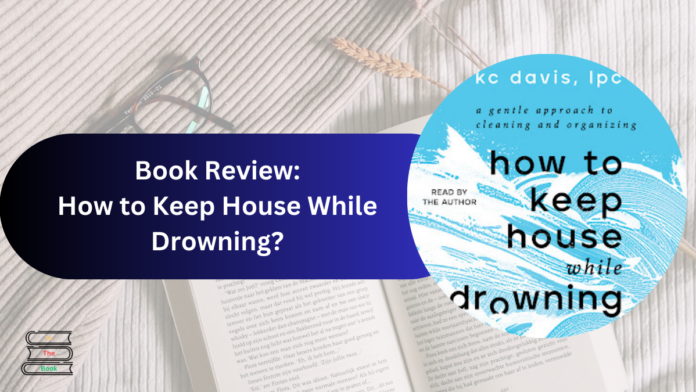“How to Keep House While Drowning” by KC Davis is a refreshing approach to housekeeping. The book has compassionate advice for those struggling to manage their homes. It emphasizes that keeping a house clean is not a moral obligation but a series of tasks that can be adapted to fit one’s needs.
Davis presents practical, gentle strategies for those overwhelmed by traditional housekeeping methods to make the process more manageable.
Contents
- What is “How to Keep House While Drowning” about?
- Why is housekeeping overwhelming for many?
- How does Davis suggest reframing housekeeping?
- What are some practical tips from the book?
- How can one maintain a clean home with limited time?
- What are the psychological benefits of a clean home?
- Conclusion
- Some Questions
- What is the main message of “How to Keep House While Drowning”?
- How does KC Davis suggest breaking down housekeeping tasks?
- What are some practical tips from the book?
- How can someone maintain a clean home with limited time?
What is “How to Keep House While Drowning” about?
This book is fundamentally about changing the way we think about housekeeping. Instead of viewing a messy home as a personal failure, Davis encourages readers to see it as a challenge that can be managed without stress or self-judgment.
She has a flexible approach that prioritizes mental health and well-being over rigid standards of cleanliness.
Why is housekeeping overwhelming for many?
Understanding why housekeeping feels overwhelming for many people is crucial. Mental health issues such as depression, anxiety, or ADHD can make traditional housekeeping methods feel too hard.
The pressure to maintain a spotless home can worsen feelings of inadequacy and stress. Busy schedules and demanding jobs leave little time for thorough cleaning routines, making it tough to manage a clean home and other responsibilities.
Also, the desire for perfection can lead to procrastination, causing tasks to be postponed indefinitely.
How does Davis suggest reframing housekeeping?
Davis suggests a task-oriented approach, breaking down housekeeping into manageable parts. She emphasizes focusing on individual tasks rather than the entire house to avoid feeling overwhelmed.
Prioritize functional cleaning, such as keeping the kitchen clean enough to cook or the bathroom sanitary enough to use comfortably, rather than deep cleaning every corner.
She advocates for a compassionate approach, encouraging readers to acknowledge their efforts and progress, no matter how small, instead of fixating on what remains undone.
What are some practical tips from the book?
Here are some practical tips from the book to consider:
- Start with small wins, like making the bed or tidying up a small area. These small tasks can build momentum and motivation.
- Use timers. Set a timer for a short period, like 10 or 15 minutes, and clean as much as you can within that time. This makes tasks feel more manageable.
- Implement simple routines that fit into your daily schedule. For example, do a quick tidy-up each morning or evening to maintain basic order.
- Donate or discard items that no longer serve you, making it easier to maintain a clean environment.
- Seek support from family members or friends. Sharing the responsibility can lighten the load and make housekeeping more manageable.
How can one maintain a clean home with limited time?
Maintaining a clean home with limited time can be challenging, but it is possible with these strategies:
- Prioritize tasks by identifying the most critical areas that need attention. It is okay if some things get done later.
- Integrate cleaning into daily activities. For instance, clean the bathroom while getting ready in the morning or tidy up the kitchen while cooking.
- Use multipurpose cleaners to simplify cleaning supplies, save time, and reduce clutter.
- Delegate tasks if you live with others. Distribute chores evenly. Even young children can help with simple tasks, fostering a sense of responsibility.
What are the psychological benefits of a clean home?
A clean home has some psychological benefits:
- A tidy environment can lower stress levels by creating a sense of order and control.
- Clutter-free spaces can enhance concentration and productivity, making it easier to focus on tasks.
- Clean and organized spaces can boost mood and overall well-being, providing a more pleasant living environment.
- Maintaining a clean bedroom can improve sleep quality by creating a calm and relaxing atmosphere.
Conclusion
“How to Keep House While Drowning” by KC Davis has a compassionate and practical approach to housekeeping, especially for those overwhelmed by traditional methods.
By breaking tasks into manageable parts, prioritizing functional cleaning, and adopting a gentle, self-compassionate mindset, Davis provides readers with the tools to maintain a clean home without sacrificing their mental health.
Her advice is especially valuable for those struggling with mental health issues, lack of time, or perfectionism, making housekeeping feel achievable and less daunting.
Some Questions
What is the main message of “How to Keep House While Drowning”?
The book emphasizes that keeping a clean home is not a moral obligation but a series of manageable tasks that can be adapted to fit individual needs, prioritizing mental health and well-being.
How does KC Davis suggest breaking down housekeeping tasks?
Davis recommends breaking tasks into small, manageable parts and focusing on one area at a time to avoid feeling overwhelmed.
What are some practical tips from the book?
Tips include starting with small wins, using timers, implementing simple routines, decluttering mindfully, and seeking support from others.
How can someone maintain a clean home with limited time?
Prioritize critical tasks, integrate cleaning into daily activities, simplify cleaning supplies, and delegate tasks to others.
What are the psychological benefits of a clean home?
Benefits include reduced stress, improved focus, enhanced mood, and better sleep quality.
Read More:
- Best Personalized Gift Ideas for 2025 – Unique Presents for Any Occasion
- Personalized Father’s Day Gifts 2025: Best Custom Book Ideas for Dad
- Personalized Baby Books Are 2025’s Top Baby Shower Gift – Here’s Why They’re Trending
- How Reading Books Is Healing the Mind – The Rise of Storytelling Therapy
- Top Personalized Books You Can Gift in 2025 – Unique Picks for All Ages

Chandler is an avid automobile enthusiast who is passionate about all things on wheels. From the latest car models to classic vintage rides, I love exploring the automotive world’s intricate details and engineering marvels. With years of experience in test-driving, reviewing, and analyzing cars, I provide readers with comprehensive insights and honest opinions.



























